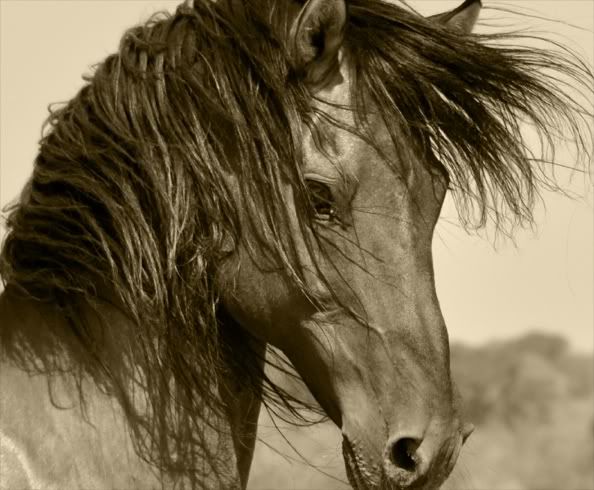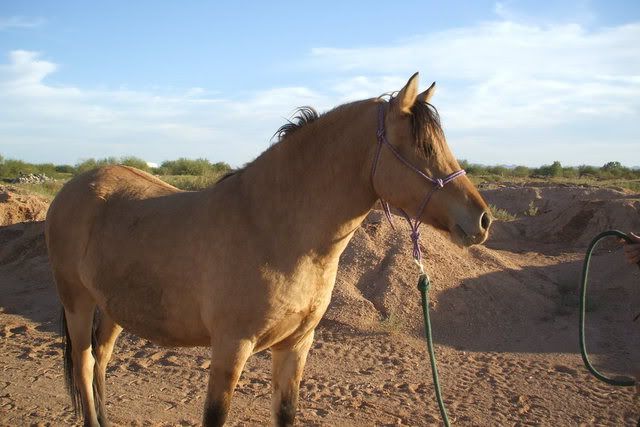Post by Michelle Clarke on Dec 25, 2007 9:43:32 GMT -5
Ah, so many lessons, so little typing space......
I guess first and foremost in my mind was my first Kiger, Zorro (aka Midnight). At the time I bought him, Eric and I were Level 3 Parelli and our place was the first "Parelli Satalite", with Eric being a PNH Instructor, so needless to say, we did Parelli. I remember having Zorro for a few days and them turning him into our big indoor arena. I was working on pushing him around until he looked at me. Well, he would trot to the other end and just stop, but not turn my way. I could not get him to canter just using my lead rope, so I picked up the carrot stick.
Not only did Zorro NOT canter, but he attacked me three times in less than a minute once I started to swing that blasted stick at him. I put the stick down and never picked it up again. I realized that even though I had all these accomplishments, I still had forced my horses by using that stick and being overly "assertive" with it.
I had to learn that lesson later under saddle with him too, when I could not get him to canter there either. I kept trying to force it instead of letting it happen and fixing up situations to encourage it.
That horse taught me so much because all he gave was just raw honesty and sometimes it was not pretty, let me tell you.
Zorro helped me learn how to really, truely ask a horse to do something. All of the stuff I learned, even though it was "natural", it was not natural to him and I learned that I had been teaching my horses to be what someone else had deemed as natural. I then began to ride him loose in the arena without a bridle so he could be as honest as he needed to be to show me. I would move and do different things with my body until I got the desired response. This is how I developed my "training" system with horses and was enlightened to the fact that not every horse is the same and each requires a different approach to be able to accomplish the tasks set before them. There is no A+B=C here.
Not all horses take the trot aide like this, some may need this in order for the aide to be clear and for them to make a smooth transition and feel good about it. I have learned to never have pre-concieved notions or plans for the session. Each horse will let me know where they are at that day and we work from that starting point - that is the key to success. Anything else and it is a waste of my time and just frustrates the heck out of them or is it the other way around???!!!
I guess first and foremost in my mind was my first Kiger, Zorro (aka Midnight). At the time I bought him, Eric and I were Level 3 Parelli and our place was the first "Parelli Satalite", with Eric being a PNH Instructor, so needless to say, we did Parelli. I remember having Zorro for a few days and them turning him into our big indoor arena. I was working on pushing him around until he looked at me. Well, he would trot to the other end and just stop, but not turn my way. I could not get him to canter just using my lead rope, so I picked up the carrot stick.
Not only did Zorro NOT canter, but he attacked me three times in less than a minute once I started to swing that blasted stick at him. I put the stick down and never picked it up again. I realized that even though I had all these accomplishments, I still had forced my horses by using that stick and being overly "assertive" with it.
I had to learn that lesson later under saddle with him too, when I could not get him to canter there either. I kept trying to force it instead of letting it happen and fixing up situations to encourage it.
That horse taught me so much because all he gave was just raw honesty and sometimes it was not pretty, let me tell you.
Zorro helped me learn how to really, truely ask a horse to do something. All of the stuff I learned, even though it was "natural", it was not natural to him and I learned that I had been teaching my horses to be what someone else had deemed as natural. I then began to ride him loose in the arena without a bridle so he could be as honest as he needed to be to show me. I would move and do different things with my body until I got the desired response. This is how I developed my "training" system with horses and was enlightened to the fact that not every horse is the same and each requires a different approach to be able to accomplish the tasks set before them. There is no A+B=C here.
Not all horses take the trot aide like this, some may need this in order for the aide to be clear and for them to make a smooth transition and feel good about it. I have learned to never have pre-concieved notions or plans for the session. Each horse will let me know where they are at that day and we work from that starting point - that is the key to success. Anything else and it is a waste of my time and just frustrates the heck out of them or is it the other way around???!!!




